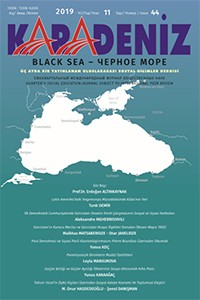Abstract
The article
depicts the attitude of the Consistuent Assembly, the Supreme Legislative Body
of the Democratic Republic of Georgia to events taking place between the Soviet
Russia and Georgia in April-May 1920: At the end of April 1920, the Soviet regime
was almost invigorated in Azerbaijan, there was revealed union of the Soviet Russia and Turkey of Mustafa Kemal,
which, according to Georgian politicians, resembled the "Brest-Litovsk New
Deal" for division of the South Caucasus.
The threat of
Bolshevism actually threatened Georgia as well. In this situation, the
Democratic Republic of Georgia expressed its readiness both to defend itself
and negotiate with the Soviet Russia. The developments showed that both of
these proved to be necessary: By the beginning of May 1920, Red Army units
invaded the territory of Georgia from within Azerbaijan. The Georgian Armed
Forces repulsed the enemy and forced them to retreat.
Negotiations
with the Soviet Russia on May 7, 1920 also led to the conclusion of a peace
treaty between the two countries in Moscow. Under the treaty, Russia
unconditionally acknowledged Georgia’s state independence and recognized it
within its historical borders.
There
are revealed unknown before details of the negotiations
between the Democratic Republic of Georgia and the Soviet Russia in May 1920 in
Moscow; are covered the views of the Georgian political spectrum within the
Consistuent Assembly on Bolshevism as a political regime of the Soviet Russia,
its imperialist nature and ideology; There is analyzed the work of the sessions
of the Supreme Legislative Body of Georgia on April 30, 1920 and May 11, 1920,
dealing with critical issues concerning the regulation of relations between
Russia and Georgia.
Keywords
References
- (Georgia III, 2019) Saqartvelos damfuznebeli kreba. Sxdomis oqmebi. Tomi III. 1919 wlis 28 ivlisi – 11 noemberi, Tbilisi, saqartvelos erovnuli bibliotekis gamomcemloba (Consistuent Assembly of Georgia. Session Minutes. Volume III. July 28 - November 11, 1919, Tbilisi, Publishing House of the National Library of Georgia).
- (Georgia VI, 2019) Saqartvelos damfuznebeli kreba. Sxdomis oqmebi. Tomi VI. 1920 wlis 19 marti – 6 ivlisi, Tbilisi, saqartvelos erovnuli bibliotekis gamomcemloba (Consistuent Assembly of Georgia. Session Minutes. Volume VI. March 19 - July 6, 1920, Tbilisi, Publishing House of the National Library of Georgia).
- Jordania N. (1990). Chemi warsuli, gamomcemloba ,,sarangi” (My Past, Tbilisi, Publishing House “Sarang”).
- Janelidze O. (2013). Narkvevebi saqartvelo-rusetis urtiertobis istoriidan, tbilisi, gamomcemloba ,,saari” (Essays from the History of Georgian-Russian Relations, Tbilisi, Publishing House “Saari”).
- Klde (1920). Newspaper “The Klde”, 1920, April 30.
- (National Archives of Georgia). Saqartvelos erovnuli arqivi, saistorio centraluri arqivi (National Archives of Georgia, Historical Central Archives, Harvard Foundation Microfilms, Case # 753).
- Sakhalkho Sakme (1920). Newspaper Sakhalkho Sakme, 1920, November 18.
- Toidze L. (1990). Intervenciac, okupaciac, zaldatanebiti gasabwoebac, faqtobrivi aneqsiac, tbilisi, gamomcemloba ,,iverta mxare” (Intervention, Occupation, Forced sovietization, Actual annexation, Tbilisi, “Iverta Mkhare” Publishing House).
- Uratadze G. (1959). Namdvili da yalbi istoria, parizi (True and False History, Paris).
Abstract
References
- (Georgia III, 2019) Saqartvelos damfuznebeli kreba. Sxdomis oqmebi. Tomi III. 1919 wlis 28 ivlisi – 11 noemberi, Tbilisi, saqartvelos erovnuli bibliotekis gamomcemloba (Consistuent Assembly of Georgia. Session Minutes. Volume III. July 28 - November 11, 1919, Tbilisi, Publishing House of the National Library of Georgia).
- (Georgia VI, 2019) Saqartvelos damfuznebeli kreba. Sxdomis oqmebi. Tomi VI. 1920 wlis 19 marti – 6 ivlisi, Tbilisi, saqartvelos erovnuli bibliotekis gamomcemloba (Consistuent Assembly of Georgia. Session Minutes. Volume VI. March 19 - July 6, 1920, Tbilisi, Publishing House of the National Library of Georgia).
- Jordania N. (1990). Chemi warsuli, gamomcemloba ,,sarangi” (My Past, Tbilisi, Publishing House “Sarang”).
- Janelidze O. (2013). Narkvevebi saqartvelo-rusetis urtiertobis istoriidan, tbilisi, gamomcemloba ,,saari” (Essays from the History of Georgian-Russian Relations, Tbilisi, Publishing House “Saari”).
- Klde (1920). Newspaper “The Klde”, 1920, April 30.
- (National Archives of Georgia). Saqartvelos erovnuli arqivi, saistorio centraluri arqivi (National Archives of Georgia, Historical Central Archives, Harvard Foundation Microfilms, Case # 753).
- Sakhalkho Sakme (1920). Newspaper Sakhalkho Sakme, 1920, November 18.
- Toidze L. (1990). Intervenciac, okupaciac, zaldatanebiti gasabwoebac, faqtobrivi aneqsiac, tbilisi, gamomcemloba ,,iverta mxare” (Intervention, Occupation, Forced sovietization, Actual annexation, Tbilisi, “Iverta Mkhare” Publishing House).
- Uratadze G. (1959). Namdvili da yalbi istoria, parizi (True and False History, Paris).
Details
| Primary Language | English |
|---|---|
| Journal Section | Articles |
| Authors | |
| Publication Date | December 15, 2019 |
| Submission Date | October 7, 2019 |
| Published in Issue | Year 2019 Issue: 44 |


